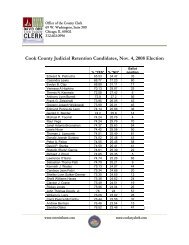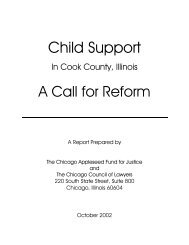Videoconferencing in Removal Hearings: A Case Study of the ...
Videoconferencing in Removal Hearings: A Case Study of the ...
Videoconferencing in Removal Hearings: A Case Study of the ...
Create successful ePaper yourself
Turn your PDF publications into a flip-book with our unique Google optimized e-Paper software.
CONCLUSION<br />
Mandatory detention and aggressive enforcement <strong>of</strong> <strong>the</strong> immigration laws have<br />
placed stra<strong>in</strong>s on immigration courts, creat<strong>in</strong>g a pressure to resolve cases more quickly<br />
and efficiently. Aga<strong>in</strong>st this pressure must be balanced <strong>the</strong> due process rights <strong>of</strong><br />
immigrants, who are both important contributors to our national economy and culture,<br />
and a vulnerable m<strong>in</strong>ority. As more than one court has observed, “virtual reality is rarely<br />
a substitute for actual presence and . . . even <strong>in</strong> an age <strong>of</strong> advanc<strong>in</strong>g technology, watch<strong>in</strong>g<br />
an event on <strong>the</strong> screen rema<strong>in</strong>s less than <strong>the</strong> complete equivalent <strong>of</strong> actually attend<strong>in</strong>g<br />
it.” 77 Given this truth, special care must be taken to assure that remote immigrants are<br />
afforded <strong>the</strong> same process and treated with <strong>the</strong> same respect as if <strong>the</strong>y were <strong>in</strong> court. This<br />
is so particularly <strong>in</strong> <strong>the</strong> case <strong>of</strong> deta<strong>in</strong>ed immigrants, who have greater barriers to<br />
access<strong>in</strong>g counsel and are <strong>of</strong>ten housed far from family.<br />
We found much evidence to suggest that <strong>the</strong> right balance has not been achieved.<br />
Remote immigrants <strong>of</strong>ten experience problems with technology, presentation <strong>of</strong><br />
evidence, access to <strong>the</strong>ir attorney, or language <strong>in</strong>terpretation. They are more likely to<br />
experience <strong>the</strong>se problems if <strong>the</strong>y do not speak English, and <strong>the</strong>y are more likely to be<br />
ordered removed at <strong>the</strong>ir hear<strong>in</strong>g if <strong>the</strong>y are Lat<strong>in</strong>os, especially if <strong>the</strong>y are non-English<br />
speak<strong>in</strong>g Lat<strong>in</strong>os. At <strong>the</strong> same time, we found little evidence to support <strong>the</strong> claim that<br />
videoconferenc<strong>in</strong>g enhances efficiency. Given <strong>the</strong> real danger that immigrants are be<strong>in</strong>g<br />
hurt by videoconferenc<strong>in</strong>g, we propose that EOIR declare a moratorium on<br />
videoconference removal hear<strong>in</strong>gs, at least until hear<strong>in</strong>gs are improved and appropriately<br />
regulated.<br />
77 th<br />
Rusu v. INS, 296 F.3d 316, 322 (4 Cir. 2002) (quot<strong>in</strong>g United States v. Lawrence, 248 F.3d 300, 304<br />
(4 th Cir. 2001)).<br />
60




